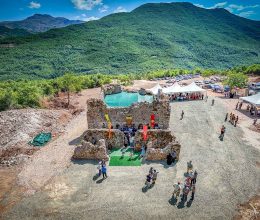In the Name of the Father and of the Son and of the Holy Spirit
The Lord God created man so that he might be nourished and live forever. It is obvious that if we are not nourished with bodily food, we will undergo biological death. Exactly the same applies to eternal being: in order to exist with an eternal existence, we need to be nourished by the eternal God. When the beginningless Creator created man and placed him in the Garden of Eden, he also created food for him. In the first pages of the Book of Genesis, we read: “See, I have given you every herb that yields seed which is on the face of all the earth, and every tree whose fruit yields seed; to you, it shall be for food” (Genesis 1:29). There was only one tree, the tree of the knowledge of good and evil, from which man could not eat without God’s approval.

Furthermore, the man was nourished then by constant communion with God. The Creator of the universe came to Eden to speak with His creation face to face. However, as He knows, when Adam and Eve broke the only commandment, then the most horrible thing would happen— death. He was created to live and delight forever before the face of God, and then he died, both spiritually and biologically. What man needed was a life-giving medicine, a living food that would rejuvenate this dead man and restore his bodily and spiritual equilibrium, his original beauty. Such heavenly food came to us incarnate in the Person of the God-man Jesus Christ, as He Himself testifies in His Gospel: “I am the living bread which came down from heaven. If anyone eats of this bread, he will live forever; and the bread that I shall give is My flesh, which I shall give for the life of the world” (John 6:51).
In today’s Holy Gospel we heard the parable about the Word of God described as a fertile seed. Its simple beginning is very striking: “A sower went out to sow his seed” (Luke 8:5). He went out. From where did he go out? From where did that Divine Sower come into this world? “I came forth from the Father and have come into the world. Again, I leave the world and go to the Father” (John 16:28) said the Lord Jesus Christ to the disciples before He was handed over to torture and crucifixion. He is the Sower Who sows His seed of dignity, majesty, and beauty. He is the Word Who has become eternal food for each of us. His seed needs to sprout forth in us, to bear fruit and give life, and to be our guarantee for eternity. He is the Life-giving Word Who proceeds from the Father and Who became incarnate from the Most Pure Virgin that He might be poured out on the world as living water unto resurrection and eternal life. Do you remember what the Lord said to the Samaritan woman at Jacob’s spring, when she asked Him with surprise what kind of water a person can drink from and never thirst? “Whoever drinks of this water will thirst again, but whoever drinks of the water that I shall give him will never thirst. But the water that I shall give him will become in him a fountain of water springing up into everlasting life.” (John 4:13-14).
The Lord Jesus Christ, then, is the living bread and the living water, and if someone eats and drinks of Him they shall not die, but live. First and foremost, He is man’s daily nourishment. What do we pray daily in the “Our Father”? “Give us this day our daily bread.” This is speaking of the bread that we need so much, which is essential for us to have life in ourselves. A person is truly alive only when he has the Word of God in him, the Word which came forth, emptied Himself of Divinity, humbled Himself, and became man. Of course, He remained God, but still, he also became man in the flesh. The perfect God became perfect Man, in order to perfect fallen humanity. And here He is now, sowing His seed of love, goodness, joy, and light, speaking to people through His Gospel and His Church. As the only one who can see into hearts, He knows how much people receive His word in their hearts. That’s why He told us this parable, as a reminder that God’s word is sown in everyone, but not every seed lands on fertile soil. You see, he equates the most unfeeling hearts with hard, compressed ground by the side of the road, which will not be able to accept any seeds at all. This represents those who have no sense of God and have become so inwardly numb that they do not even want to hear about beautiful or exalted things. Others somehow receive it, but then, due to the numerous temptations, worries, and pleasures of this age, they do not keep going and give up. Finally, He tells us about the good earth, which received the seed, cultivated it, and when it sprouted, it bore a hundredfold fruit. Then, asked by the disciples about the meaning of the parable, Christ adds that what fell on the good ground are those who hear the Word and keep it in a good and pure heart, and bear fruit in patience (Luke 8:8,15).

Beloved, the seed that God has planted in us is priceless. In the Gospel, the Lord Jesus tells another parable about a merchant who is looking for beautiful pearls. As soon as he finds a pearl of great price, he goes and sells everything he has and buys it (Matthew 13:45-46). That pearl is the Word of God, which is more beautiful, nobler, purer, and sweeter than anything else. Cultivated in us with care and love, the Word of God will bear a hundredfold fruit with the fruit of the Holy Spirit which is love, joy, peace, long-suffering, gentleness, goodness, faithfulness, meekness, and self-control (Galatians 5:22- 23). You know, the word “culture” comes from the Latin verb colo, which means “cultivate, work, grow, nurture, or decorate.” Therefore, let us cultivate the eternal Word of God in the field of our hearts so that it becomes a fertile field that will grow us into citizens of Heaven. Let us be cultural farmers of the Divine culture unto salvation and eternal life.
Amen!















